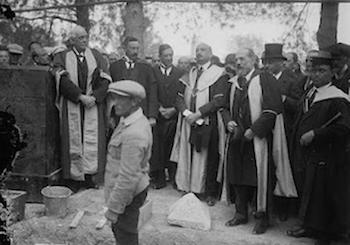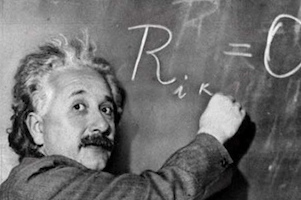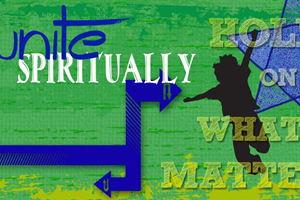Why Have the Jews Forgotten What We Are All About?
by Lord Jonathan Sacks
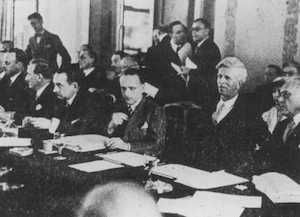
Scene during the Evian Conference on Jewish refugees. Evian-les-Bains, France, July 1938. Photo Courtesy of Leo Baeck Institute
Israel was born amid the conviction, entirely correct, more than 100 percent correct, to the core, that nobody else is going to help us and we just have to do it ourselves.
What made Israel a moral necessity is the conference at Evian in July, 1938. Thirty-four countries around the world, knowing what was going to happen to the Jewish people, gathered together to see what they could do to help, and all 34 closed their doors. That was the moment when Jews discovered that on all the surface of the earth, there was not one square inch they could call home — in the sense of the place where, when you have to go there, they have to let you in. So, Israel was born in a sense of isolation.
Jews have been to every part of the inhabited earth and yet in 4,000 years there only ever was one place on earth where Jews could do what they are called on to do — to construct a society in accordance with our deepest beliefs. That is what I call the second task of Zionism. The first task of Zionism: build a Jewish state. The second task: now build a Jewish society. A society on biblical lines…. [in practical terms]
It means a society of tzedek, mishpat, hesed and rahamim (justice, law, kindness and mercy), which means a society where everyone feels, I have dignity and I have a place here. I am not excluded.
I am looking in the future for two things in Israel, which will come. They will only come from Israelis.
Number one: The rebirth of prophecy, except instead of visions from heaven, they will appear in the op-ed columns. We will have prophets. Maybe we have them already.
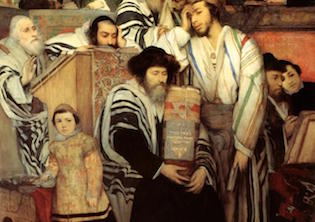
Hasidic Jews praying in the synagogue on Yom Kippur, by Maurycy Gottlieb
And number two: Israel’s own, autonomous, indigenous, functional equivalent of the Hassidic movement in 18th century Eastern Europe. You know, a group of Jews who suddenly get up and say, Who is caring about the guys who don’t go to shul? Who is giving a sense of dignity to people who don’t know shas ba’al peh (the books of the Mishneh from memory)?
So, we need a Baal Shem Tov. We need an Amos. And they will both appear in Israel in the next 25 years. And then Israel will feel a whole lot healthier as a society.
Israel is where the Jewish future is being made. Israel is the only place on earth where Jews can construct a society. Israel is where it all becomes real. You cannot do that anywhere outside Israel.
How is it that when, for the first time in 4,000 years of history, you have sovereignty and statehood in Israel, equality and dignity in the Diaspora, have we suddenly forgotten what we’re all about — which is bringing spiritual and moral values into the heart of society? We’re seeing the Jewish world split between those who are in the heart of society but a long way from their Judaism, and those who are in the heart of Judaism but a long way from the mainstream of society.
We seem to have been split in two; we’re kind of a schizophrenic people. I want to heal that a little bit just by being a very humble presence on the sidelines, a kind of scholar in residence for the people who are trying to make a better Jewish future.
If you were to ask anyone what are the five major problems facing humanity in the 21st Century, by more or less universal consent they would be: climate change, global warming; the problem of the growing gap between first and third world economies; asylum seekers; terror, and creating democracies in parts of the world that have no tradition of it.
I see Israel as a symbol of hope for every country in the world. Israel has shown what a small nation can achieve under the most adverse conditions.
In all those areas Israel has led the world. It is the only country that had more trees at the end of the 20th century than at the beginning. It was the first country to plant forests rather than tear them down. It is the world’s leading example of a third world economy that became a cutting edge first world economy.
Together with the United States it is the only country in the world which is made out of asylum seekers. The last time I looked they came from 103 different countries speaking 82 different languages — probably more than that by now. Somehow out of it, it’s forged an incredibly dynamic nation.

'Red Alert' app warns Israelis of attacks
It is the country that has developed all the effective measures against terror, and any country in the world that wants to fight terror has to come to Israel or study Israel’s methods.
And finally, Israel brought democracy to the Middle East. I call Israel a hyper-democracy. It has the most politically engaged electorate in the world. It is and has remained a democracy with an independent judiciary and a free press. As I think you put it once David, it is the only country where a Muslim can get up and criticize the government and wake up the next morning a free man.
I see Israel as a symbol of hope for every country in the world. Israel has shown what a small nation can achieve under the most adverse conditions. It’s not by accident that Israel’s national anthem is Hatkivah — The Hope — because that is really what it represents to the world.
And when you clear away the noise, most of which is critical to Israel, and you listen underneath, you listen to politicians in their private moments, then you recognize that there is a real and genuine respect for Israel’s achievements.
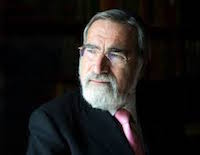
A global religious leader, philosopher, bestselling author and moral voice for our time, Rabbi Lord Jonathan Sacks is currently the Ingeborg and Ira Rennert Global Distinguished Professor of Judaic Thought at New York University and the Kressel and Ephrat Family University Professor of Jewish Thought at Yeshiva University. He is also Professor of Law, Ethics and the Bible at King’s College London. Previously, Rabbi Sacks served as Chief Rabbi of the United Hebrew Congregations of the Commonwealth between September 1991 and September 2013, only the sixth incumbent since the role was formalized in 1845.
Excerpted from article in The Times of Israel by David Horowitz

